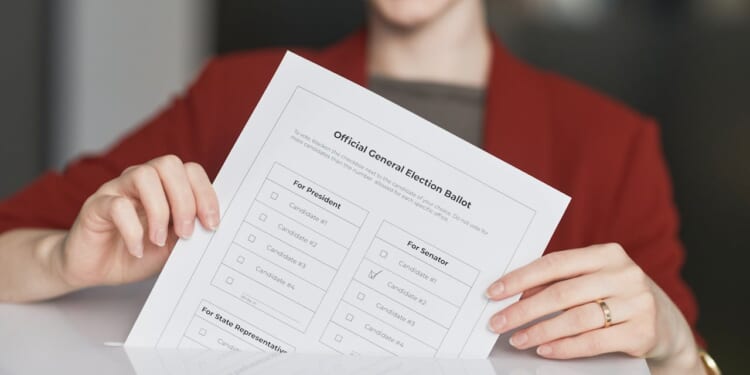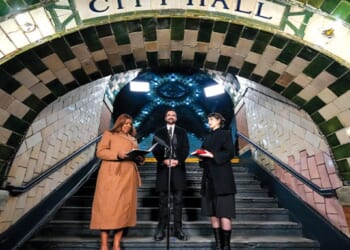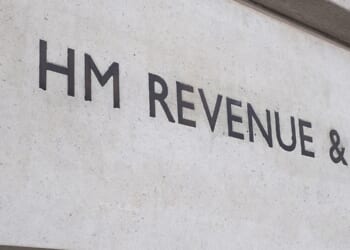Plaintiffs are feeling “very optimistic” the U.S. Supreme Court will rule in their favor in a pivotal elections case recently heard before the justices, legal counsel and Judicial Watch attorney Russ Nobile told The Federalist.
On Wednesday, the nation’s highest court held oral arguments in Bost v. Illinois State Board of Elections. The case centers around a 2022 lawsuit filed by Rep. Mike Bost, R-Ill., and other Republicans that challenges the legality of a state law allowing the counting of ballots up to two weeks after Election Day.
Previously dismissed by lower courts over alleged “lack of standing,” Bost and Co. — represented by Judicial Watch — petitioned the Supreme Court to address the “sole question” of whether they, “as federal candidates, have pleaded sufficient factual allegations to show Article III standing to challenge state time, place, and manner regulations concerning their federal elections.” As The Federalist previously reported, “Standing has been a contentious issue in election litigation” and was at “the forefront of several prominent lawsuits filed contesting the 2020 presidential election cycle, as well as a case involving a challenge to then-President Biden’s ‘Bidenbucks‘ executive order.”
Throughout Wednesday’s hearing, the justices probed both parties about a myriad of issues related to election litigation and factors courts should consider when deciding on whether or not to grant standing to federal candidates filing such suits.
Speaking with The Federalist, Nobile noted how Paul Clement, who represented plaintiffs before the court, presented “three different options” for the justices to consider on the issue of candidate standing. These key points included arguments that “a candidate has a natural interest in an accurate vote count, regardless of how [the election] works out;” “a competitive injury [argument], [wherein] late-arriving ballots must be considered illegal under the [presented] theory and … will change the outcome of our vote margin, either up or down;” and a “simple injury [argument], in which running the election extra days costs [the candidate] more money.”
Nobile said SCOTUS examined all three points throughout oral arguments, but that “a lot of” the justices’ questions centered on plaintiffs’ “competitive injury” argument about “late-arriving ballots.” He added that while the court appeared “hesitant” on that issue, it seemed “very comfortable with the other two ideas” presented by Clement.
“It doesn’t really matter if you’re gonna win or lose an election. You have, as a candidate, a unique interest that’s recognizable under the law to make sure that your election is run with legal ballots or legal votes,” Nobile said.
The Judicial Watch attorney went on to note that the high court didn’t appear “interested” in the argument put forward by Illinois Solicitor General Jane Notz, who, as described by Nobile, seemed to suggest that candidate standing “depends on how close the election is and [that a candidate] must prove [he is] going to win or lose the election based on a challenged practice.”
“Frankly, that puts courts in a difficult position six months in advance of the election of trying to decide who’s winning or losing,” Nobile said. “Alternatively, it puts courts in a very difficult position of making decisions after Election Day and trying to decide if an electoral practice is going to change the outcome of an election. So, that basically means … however courts rule will sort of decide the outcome of an election, which is obviously very uncomfortable for the Supreme Court and judges.”
Chief Justice John Roberts and Associate Justice Brett Kavanaugh raised concerns about courts being asked to handle election-related litigation filed both at the height of election season and following an election, respectively. When questioning Notz, for example, Kavanaugh expressed concerns about the “chaos of post-election litigation and how [that would] play out in a circumstance like a challenge to this particular ballot-counting rule.”
[READ: Kavanaugh Blasts Illinois For Flip-Flopping On Candidate Standing In Election Litigation]
Wednesday’s hearing didn’t come without its pushback from the court’s Democrat appointees, however.
In one exchange with Clement, Associate Justice Sonia Sotomayor took issue with plaintiffs’ position that even candidates who enjoy very low prospects of winning the election should be considered for standing. The Obama appointee provided a hypothetical district where “the Republican registered parties are 98 percent” and “the Democrats are 2 [percent],” and asked Clement if his position was that the candidate “who has not just an insubstantial but a statistically almost impossible chance of winning — of losing, that that candidate can come in and seek a change of [a contested election] rule.”
“That’s correct,” Clement said, to which Sotomayor replied, “Doesn’t the absurdity of that –generally, we have said that suits should be brought by people for whom the harm is concrete in some meaningful way. Losing, let’s say, by 1 percent, more or less, can’t be meaningful on any scale.”
Associate Justices Elena Kagan and Ketanji Brown Jackson also appeared to signal their supposed concerns about existing standing issues and post-election litigation as it relates to late-arriving ballots, respectively.
In closing his remarks, Nobile noted that while plaintiffs “don’t know what exactly” the court’s final decision “will look like,” they are “very optimistic of how” oral arguments went for their side. He furthermore expressed hope that the justices will deliver a ruling that provides clear guidelines on the issue of federal candidate standing to challenge election rules moving forward.
“We think that the idea of federal candidates having standing to challenge laws affecting federal elections is pretty unremarkable, and frankly, it was unremarkable for 135 years until 2020,” Nobile said. “We would just like for federal law to go back and reflect the last 135 years that preceded 2020.”
Shawn Fleetwood is a staff writer for The Federalist and a graduate of the University of Mary Washington. He previously served as a state content writer for Convention of States Action and his work has been featured in numerous outlets, including RealClearPolitics, RealClearHealth, and Conservative Review. Follow him on Twitter @ShawnFleetwood

















